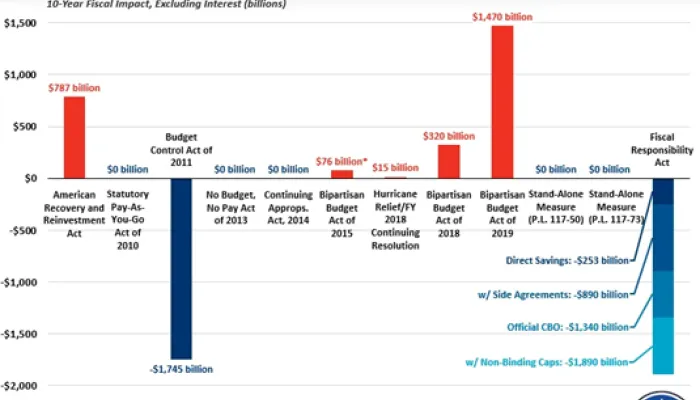Event Recap - Beyond PAYGO
Yesterday the Peterson-Pew Commission on Budget Reform hosted its first public event -- Beyond PAYGO. Five panelists discussed recent proposals to gain control over mandatory spending and put the budget on a sustainable path. (See the webcast of the event below).
The Commission also issued its first policy paper at the event, “A Closer Look at the President’s FY 2010 Budget Process Reform Proposals.” The "Closer Look" paper examines in detail how the administration's first budget takes a few initial steps toward establishing a more fiscally responsible and credible budget process. In addition, it describes the deficiencies and significant omissions in the administration's budget, including the PAYGO exceptions, its complexity, and lack of caps on discretionary spending.
The overflow event was headlined by a star-studded cast of policy wonks with expertise in budget policy and process (yes, there is such a thing as a group of star-studded policy wonks). Panelists included former heads of CBO and OMB, leaders of prominent D.C. think tanks, and former members of Congress. Moderator Morton Kondracke, executive editor of Roll Call, kicked things off by reminding everyone of the predictions that the federal budget will soon be almost entirely eaten up by the cost of a few entitlement programs, and that will mean drastic cuts elsewhere in the budget, large tax increases, or a return to the dark ages.
Unfortunately, as Kondracke and many panelists noted, budget reform isn’t the type of thing that gets people – or politicians – worked up. Ross Perot has been the only recent politician on the national platform to make the subject his true focus. And though a handful of politicians, including President Obama, have urged legislative action and made compelling statements about the need to change our spending patters before we drown in a sea of red ink, it isn’t an issue that tends to stir voters.
There was pretty broad agreement that we are, as so many have been cautioning, in a big fiscal hole that’s getting deeper. After that, though, few panelists expressed much hope that Congress would do much about it anytime soon. Panelist Jim Nussle, a Commission member and former Chairman of the House Budget Committee, pointed out that politicians are really good at saying yes, but not so good at saying no. Everyone agreed that the path to reform means everyone has to have some “skin in the game” – that both spending cuts and revenue (tax) increases have to be on the table. Neither option is politically popular.
The panel discussion was spirited but pessimistic. There was one note of optimism from Robert Greenstein: He declared that for once, he was not the lone pessimist on the panel, and argued that, “you can see some glimmers of hope,” including the administration’s submission of a legislative proposal to reinstate a statutory pay-as-you-go (PAYGO) rule.
Many of the skeptics – both on the panel and in the audience-- voiced the opinion that the Commission’s work, and its larger report on budget reform due to be released later this year, will contribute to the debate by bringing public notice to the problem and by pressuring Congress to re-gain control over spending. They all agreed that any solutions have to be bi-partisan.
Participants
Moderator
Morton Kondracke
Roll Call
Featured Speakers
Robert Reischauer
Former CBO Director
The Urban Institute
Peterson-Pew Commission on Budget Reform
Jim Nussle
Former OMB Director and House Budget Committee Chairman
The Nussle Group
Peterson-Pew Commission on Budget Reform
Rudolph Penner
Former CBO Director
The Urban Institute
Peterson-Pew Commission on Budget Reform
Tim Penny
Former Member of Congress
Peterson-Pew Commission on Budget Reform
Co-chair, Committee for a Responsible Federal Budget
Robert Greenstein
Center on Budget and Policy Priorities


